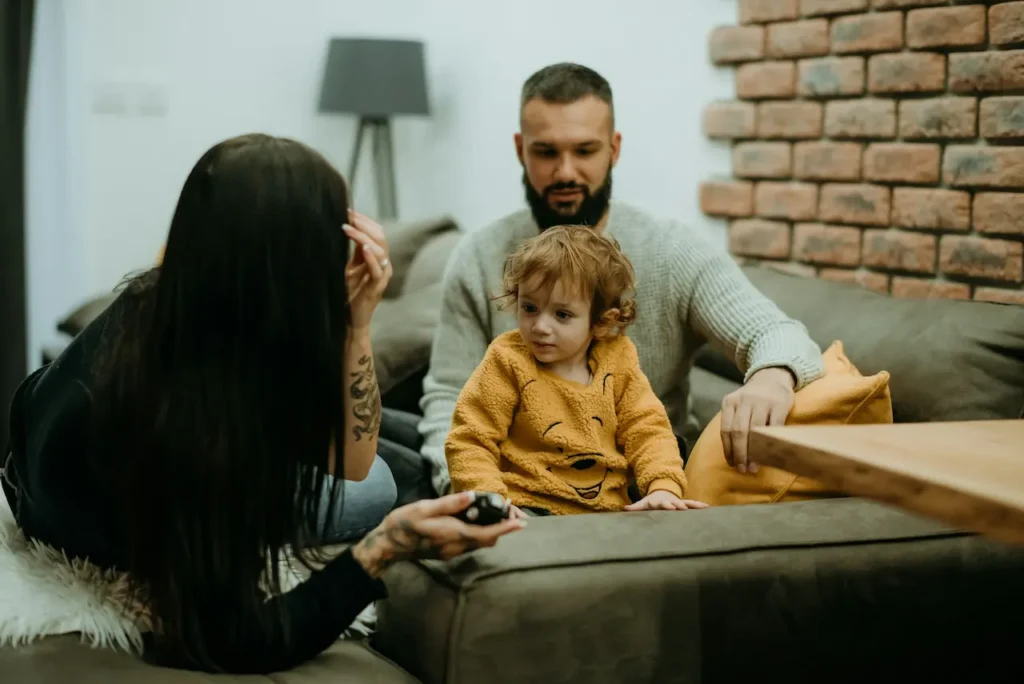Media and personal stories about divorce and separation often focus on relationships that are characterised by violence or conflict. Australian research indicates that low-conflict or cooperative relationships after separation are more common.
They are usually negotiated within the context of what British sociologist Carol Smart called an ” irrevocable ” joint-parenting agreement. It’s possible to end a relationship, but very hard to separate as parents.
We don’t know much about what “good” relationships are and how they feel after separation. A recently conducted and soon-to-be-published study aimed to investigate what such a relationship might look like.

All Good Relationships Are Not The Same
The study identified three types of post-separation good parental relationships: autonomous, allied and arm’s length. The differences were in the communication style and shared family practices between parents.
Allies
The most common relationship type was allied relationships. Parents spoke of emotional closeness with their ex-partner. They used words like “family” and “friends” a lot. They remained friends with their ex-partner, but they also acknowledged that their children were the main reason for their closeness.
Parents who were in an allied relationship described their former partners’ needs as being met with a great deal of support. Typically, they were flexible with their arrangements for care to accommodate changes in the work, personal or health circumstances of other parents. Parents also reported less tangible support, such as sharing the laundry or feeding pets.
They stressed the importance of family events like regular dinners with their children and birthdays. Their approach was seen as a way to show their children that they are “still a whole family”. It was a way to balance the needs of both parents and children, so that no one missed important events or relationships.
Relationships at Arm’s Length
Parents who are in a distance relationship with their ex-partner were absent in the former partner’s presence and present in the lives of their children. They were civil, cooperative and did not seek emotional closeness or common activities. Their shared concern for their children was the basis of any connection.
One father who participated in the study, for example, had little contact with his ex-wife outside of their children. He said:
There were clear boundaries set up to limit the interaction to children-specific matters. Family rituals were not present. Parents did not respond to their ex-partner’s needs, and care arrangements were set in stone. Parents described their relationship with their ex-partner as good because they both cared for their children and worked to meet their needs. Their children are happy and flourishing as a result.
Autonomous Relationships
Parents in autonomous relationships didn’t communicate with their ex-partner beyond the basic information on children’s schedules. Each parent responded to the needs of their children uniquely.
Parents didn’t interpret limited communication to be an indication that their former partner was not caring or incapable of parenting. After separation, parents realised that what mattered was their emotional and practical contribution to the lives of their children, not each other.

Tips for Successful Coparenting
Here are some tips to help you and your ex-partner successfully coparent your child.
Keep regular communication:
- It’s important to keep regular communication with the child, stepparents, grandparent or any other caregivers involved in your child’s life. Sharing important information and updates with others about your child, their schooling, activities, medical concerns, and daily routine can be beneficial.
Create a coparenting plan.
- Together, create a plan covering the above factors, including visitation schedules, daily routines, education, finances and medical needs.
Make an arrangement that is beneficial to both you and your ex-partner:
- Come up with a coparenting plan that will work for you. You can alternate the days or weeks that your child will spend with you and your former partner if you both live close by. If your work schedules are different, you can have the child spend mornings and evenings with each parent. You may need to have your child spend the school day with one parent and then holidays with the other if you live in two different cities.
Discuss any changes to the plan.
- The co-parenting plans may need to change based on what the child needs and the parents’ situation. All stakeholders should be informed of any updates or changes to the plan. It is important to ensure that everyone understands the plan.
Be flexible.
- Things may not always go as planned, even with the best of intentions. You should always leave some flexibility for situations where the other parent may be late or unable to pick up their child, or if the babysitter does not arrive on time. When you can, try to work with your ex-partner. This will help you gain their support when you need it.
Recognise that different parenting styles exist:
- Understand the fact that every parent has their own parenting style. Respect your ex-partner’s parenting style unless it is harmful to your child. Let them bond with your child in their way. Your child can learn to adapt better to situations and relationships if they are exposed to different parenting styles.
Spend quality time with the child you’re with:
- If you only have a limited amount of time to spend together, make it a priority to spend time with them. Plan fun activities together and keep other distractions to a minimum. Create meaningful rituals unique to you and your child.
Prepare yourself for the time when your child won’t be with you.
- It’s normal to feel a sense of loneliness or loss when your child’s not with you. This feeling can be stronger on weekends and holidays. Reframe your sense of loss to be a time to relax and rest. Schedule activities you would normally do with your child, but not when they are around. This could include seeing friends, going to the movies, planning a trip, or doing for.

Why is it important to have good relationships after separation?
The results of our interview studies cannot show a statistical link between a good relationship after separation and the children’s outcome. Parents believed that their focus on their children was the key to their happiness and development, regardless of what type of relationship they were in. Parents defined their relationship as good based on this focus.
The literature is based on the idea that it’s not the amount of time spent with each parent but the quality and nature of the relationship between the parents that makes a difference. But debates still focus on how much time the children spend with their parents.
It takes a lot of effort to maintain a good relationship after separation. It requires constant emotional consideration, careful negotiation and letting go of past wrongs. When the reward is a healthy and happy child, all the hard work will be worth it.
When should I tell my children about?
If your child asks you a question, be honest and age-appropriate. When they ask you questions, try to be as honest as possible and keep in mind their age. It’s best to wait until the divorce or separation is finalised before sharing any information.
Children are more likely to have a concrete way of thinking as they develop. This makes it difficult for them to understand ambiguity in a situation or grey areas.
What should I say to my children?
Parents should plan and have the conversation together. It can reassure children to see a united front. This sends a message to children that even though their family is changing, they can still count on both parents to look after them.
Keep your conversation short and simple. Assure your kids that you love and will always be parents to them. Also, assure them that divorce is not the fault of their children.
Don’t comment on extramarital affairs, money, or other details that are inappropriate for the age of your child. Avoid criticising, insulting, or blaming the other parent.
Tell your children it’s okay to be angry, sad or upset.
What are my children likely to feel?
Children experience many emotions when a life-changing event occurs, such as a divorce. There is no one way to experience or feel it.
Some children feel grief and sadness. Some children express resentment and anger. Some are relieved.
You may be surprised by how quickly your child adjusts to the new norm. Your child’s response to each parent may differ or change over time. It’s important to use empathy and validation to let your child feel that their feelings are okay.
Conclusion
It’s not always easy to co-parent after a divorce, but it is one of the best ways to give your child stability, love and support during a period of change. Both parents can contribute to a healthy family dynamic after divorce by focusing on respectful communications, maintaining consistency in the household, and putting their child’s well-being first.
Being present, cooperative and committed to the best interests of your child is more important than being perfect. Co-parenting is a rewarding experience for all parties involved when done with patience, empathy and a team mentality.



